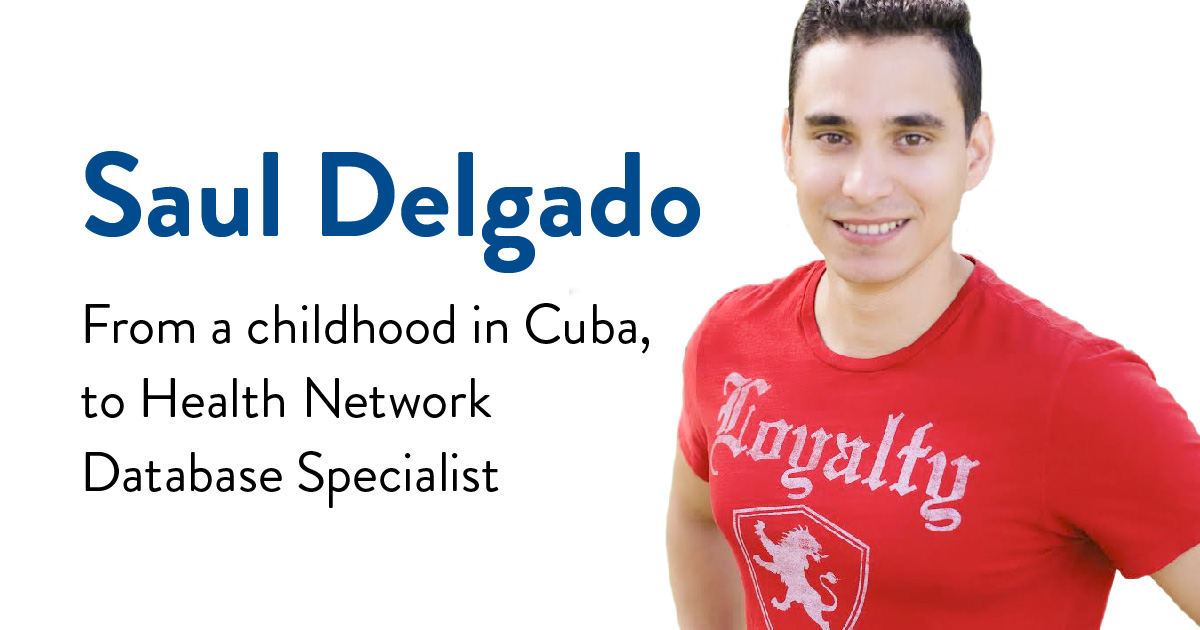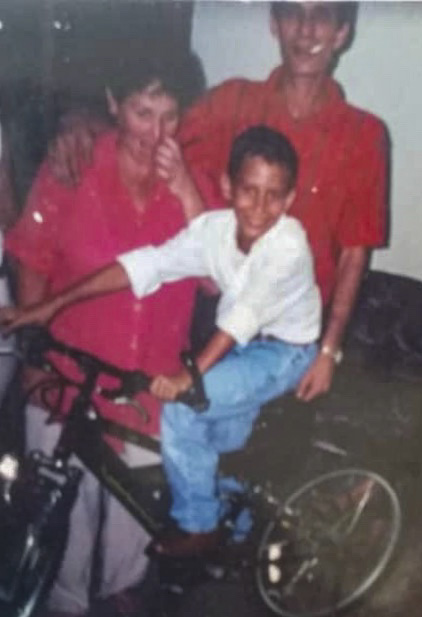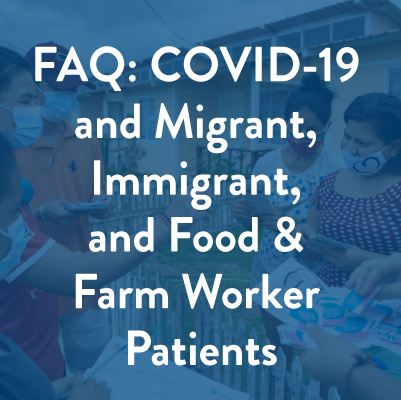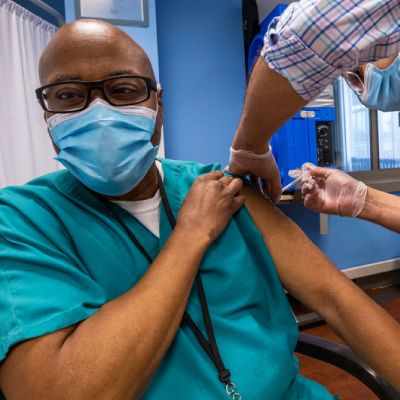- Who We Are
- Clinician Employment
- Publications
- Witness to Witness (W2W)
- Kugel & Zuroweste Health Justice Award
- Your Voice Matters: Photovoice Project
Mon, 12/02/2019 | by Claire Hutkins Seda


[Editor’s Note: Immigration at any age changes life paths. Last week, we featured the harrowing account of escaping communist Hungary, from our Chief Medical Officer, Laszlo Madaras, MD, MPH. This week, we are highlighting the immigration story of Saul Delgado, Health Network Data Specialist. Migrant Clinicians Network helps immigrants successfully make their own stories of health and well-being, despite their mobility. As we close out the year, please consider donating to MCN to help us continue this work. Donate tomorrow, on Giving Tuesday -- and your donation will be doubled by an anonymous grant.]
Saul Delgado’s childhood summers were spent climbing mango trees with his cousins in his grandmother’s backyard in San Juan y Martinez, a tobacco-growing region in the western Cuban countryside. The children were expected only to come home for meals. The rest of the time, he said, was spent deep in play. “I was free -- I could go everywhere without having to be worried,” he recalled. During the school year, Delgado lived in a small town not far away. He remembers playing dominos in the evenings after Fidel Castro’s nightly television talk. When he was eight years old, Delgado’s father learned about a US-run program that allowed people who were incarcerated by the Cuban government to bring their family to the United States. Delgado’s grandfather had been jailed when he opposed the Communist Party, many years prior, which made his entire family eligible for the program.
“My grandfather was hesitant at the time -- he didn’t want to apply, pay all that money, and then not get approved and be disappointed,” Delgado recalled. But his father talked his grandfather into it. “My dad was tired of communism,” he said. His father had previously tried to escape but his efforts were thwarted by authorities. After months of waiting, his grandfather, grandmother, father, and uncle left for the States, settling in the Austin area. A few months later, the rest of the family followed.
Delgado started at a new school, without any English language skills. Shockingly, his school had not placed him into ESL classes. There were few Spanish speakers.
“According to my parents, I would cry every time I’d get home from school,” Delgado said. “I didn’t understand what people were saying, and I didn’t have friends.” Every morning, he watched children arrive, take trays, and eat school-provided breakfast. Without knowing whether he was eligible, he would sit and wait, watching the others eat. When he didn’t understand a question on a test, which happened frequently because of the language barrier, he’d simply write, “No sé.” Eventually, his mother approached the school to get him transferred into classes more appropriate for his language skills. Slowly, things got better.
Delgado made friends with other Spanish-speakers. In Austin at that time, Spanish-speakers were primarily Mexican. Delgado learned their slang, and lost his Cuban accent in Spanish. He also quickly learned English. He spent every summer vacation in summer school, focused on advancing his English language skills.

Saul Delgado, with his mother and father. The bicycle was a welcoming present when he reunited with his father, who had arrived in Austin several months before.
About a year after his family’s arrival, his father saved enough money to buy a house in the outskirts of Austin, where his family still lives. He stayed in touch with his family in Cuba. On birthdays, the family would rise at five in the morning -- 7am, Cuban time -- to call and turn on a cassette tape of Las Mañanitas, holding the stereo up to the phone.
After high school graduation, Delgado declined to go to a four-year university, fearful of loading debt on his father, who had uprooted the family and worked so hard to stay out of poverty. “I didn’t know what [I wanted] to study,” he recalled. “I’d hear stories of people paying all this money, and then not using that degree.”
He instead started to work for his father, who is a truck driver as dispatch for his truck company. Shortly thereafter, Delgado decided to go to school to become a medical assistant, a one-year program. After his internship at a local clinic, the hospital hired him as a floating medical assistant. “I had to go around to different offices. It meant I didn’t have my own doctor, my own desk, my own computer -- I had to borrow people’s stuff. It threw me off.” The hospital wasn’t hiring for a stationary MA, so Delgado began scouring Craigslist -- where he found Migrant Clinicians Network.
When the Health Network Manager at the time, Ricardo Garay, called him, Delgado was fairly unprepared, he admitted, but was able to answer medical questions because of his background as a medical assistant. After the call, he followed up with an in-person interview -- and then didn’t hear back. But Delgado was persistent, and eager to work for MCN, particularly because his girlfriend -- who eventually became his wife -- lived in the same part of Austin as MCN’s offices, Delgado admitted with a laugh.
Delgado eventually did hear back from MCN, and was hired on as a Health Network Associate in 2013. “Saul was pretty shy when he first started with MCN, but with time he became a leader in the case management team,” recalled Deliana Garcia, Director of International Projects and Emerging Issues. “He really began to open up when he had the experience of calling a woman and telling her that her son was in detention but he was safe. She had not heard from him in some time and blessed Saul for his work. It left a deep impression.”
By 2015, Delgado was vocal in calling for an upgrade to the Health Network database. In 2016, Delgado took the lead in a strategic planning effort around database management and upgrades. His deep knowledge of the workings of Health Network, the needs of the patients and Health Network Associates, and needed additional capabilities made him an ideal lead for the project. “He brings an incredible technological ability to the program that has been lacking in the past,” said Ed Zuroweste, MD, Founding Medical Director. “He spent several years working with hundreds of patients as a Health Network Associate before he took on the new responsibilities of the database which makes him the perfect person to take us all to that next level of quality using the new database.”
Over the course of several years, Delgado worked closely with a case management systems firm to develop, pilot, and launch MCN’s new database. Delgado’s work was recognized when he was promoted to Health Network Data Specialist. He continues to handle a limited number of Health Network cases, contributing to and working with the Health Network team, while also developing new database functionality and sorting data as the needs arise. And his work has been much-needed.
“As Chief Medical Officer for MCN, I depend on a strong database for our Health Network to provide mobile case management, and Saul has been a key figure in keeping our system up to date and agile to improve our impact on our patients’ health as they move from one health center to another,” said Laszlo Madaras, MD, MPH. “He is very dependable and responsive to our many needs and requirements. He has a great sense of humor and patience with those of us who are not quite as techno-savvy as he is.”
“We have had many excellent Health Network Associates over the years, but none of them have had the ability to understand all of the intricacies of our database as Saul has,” added Dr. Zuroweste. Both Dr. Zuroweste and Dr. Madaras have worked closely with Delgado for years. “Saul has just a great laid-back personality that enables him to tolerate all of the frustrations that working with data and the programs that produce the data can entail.”
Thank you to Saul Delgado and the Health Network team for your hard work.
Read more about Health Network, how it works, and how your health center can utilize the program on our Health Network page.
Read more about Health Network, how it works, and how your health center can utilize the program on our Health Network page.
Like what you see? Amplify our collective voice with a contribution.
Got some good news to share? Contact us on our social media pages above.
Return to the main blog page or sign up for blog updates here.







